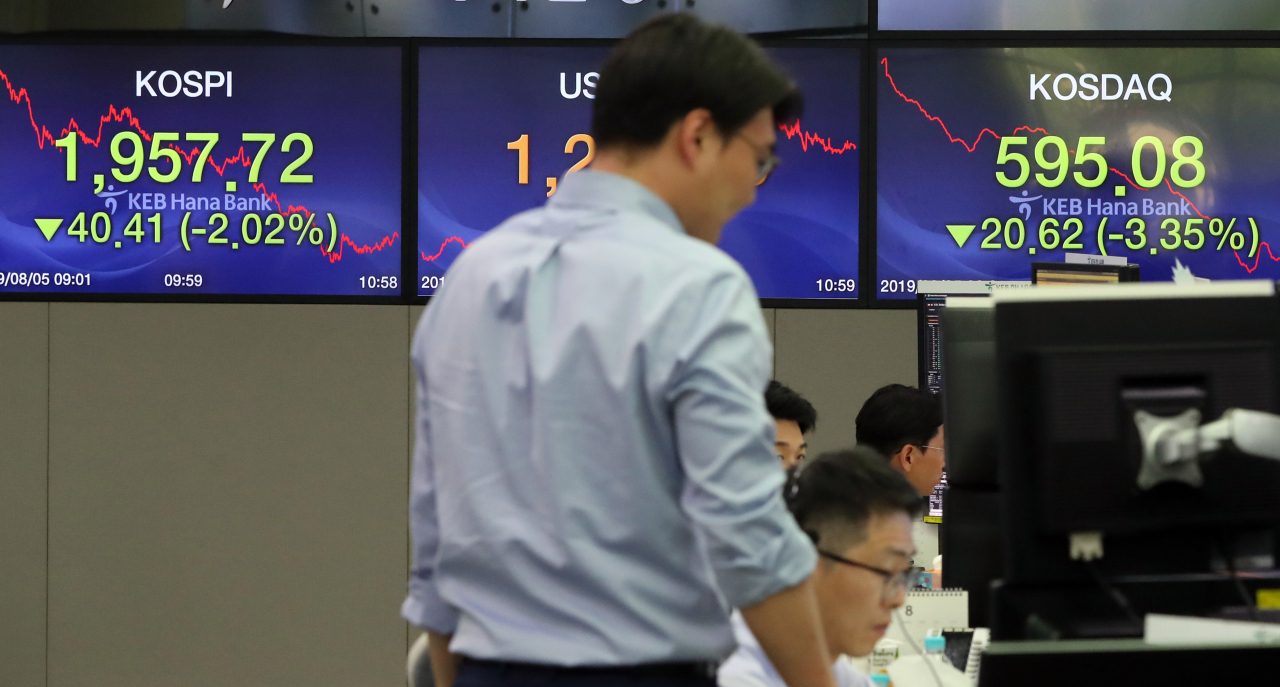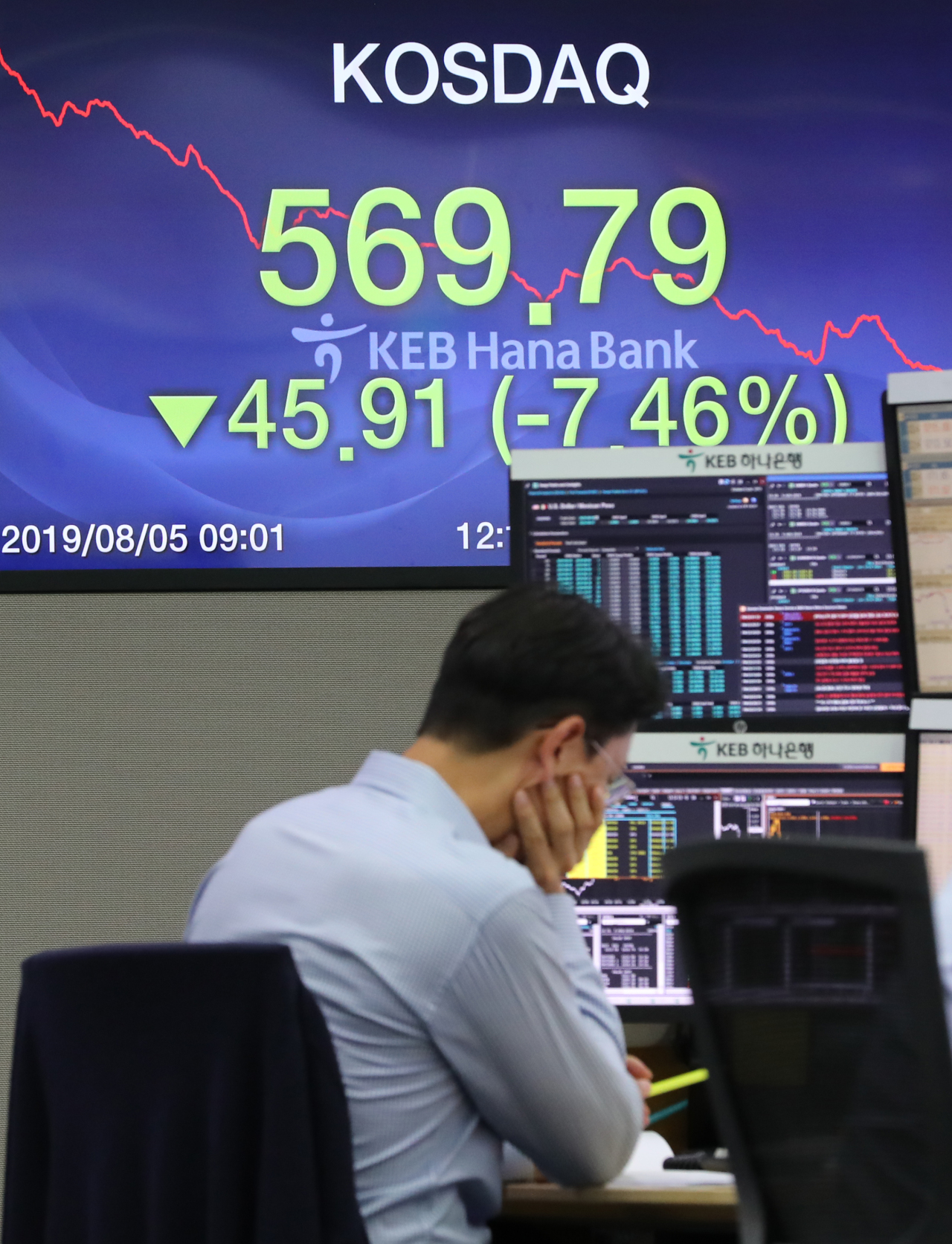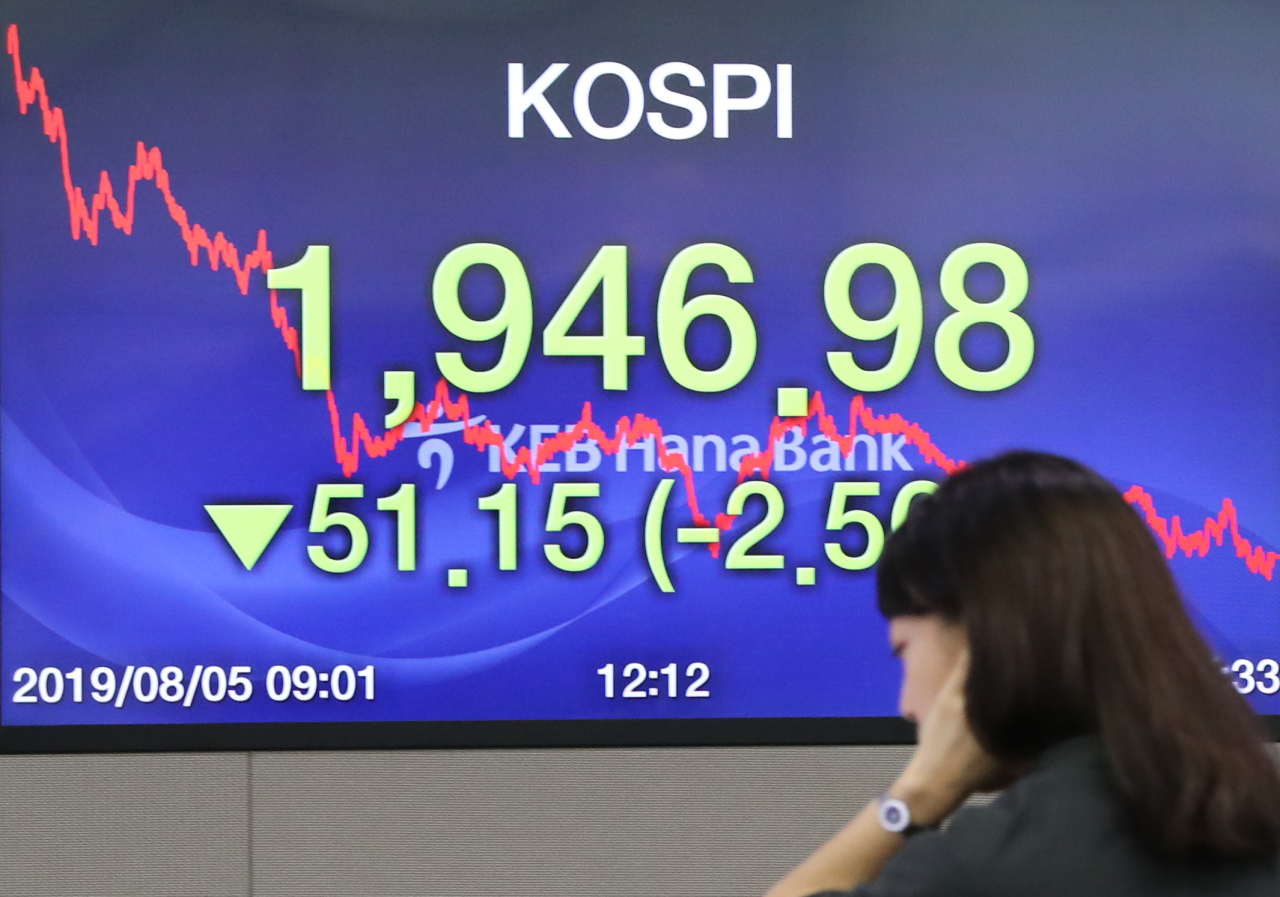KRX halts trading on Kosdaq as it breaches 600 points
By Jung Min-kyungPublished : Aug. 5, 2019 - 16:55
South Korea’s secondary bourse Kosdaq sank below the psychologically important 600-point threshold for the first time in 17 months on Monday, triggering the stock exchange to temporarily halt trading as investor sentiment plummeted due to the escalating trade spat between Seoul and Tokyo.
The Korean won also traded at a three-year low against the US dollar, breaking its own significant 1,200-won mark. It closed at 1,215.30 won after hitting 1218.30 won at 10:40 a.m., marking its lowest level since March 3, 2016.

The Kosdaq ended at 569.79, down 7.46 percent from the previous session, after swiftly falling below 600 and remaining below that mark throughout the trading day.
The closing price marked the lowest since Jan. 8, 2015, when the corresponding figure was 566.43.
The nation’s sole bourse operator Korea Exchange (KRX) activated a “sidecar,” meaning it temporarily halted the trading of shares, for five minutes around 2 p.m. after the Kosdaq index slipped more than 6 percent. It was the first time the sidecar was activated since June 24, 2016.

Despite the government’s apparent attempts to reassure investors with contingency plans, the Korean financial market has been rattled by the escalating trade row between Seoul and Tokyo in recent weeks.
Foreigners net sold Kosdaq stocks worth 37.2 billion won ($30.6 million), while institutional and individual investors each net purchased shares worth 23.6 billion and 10.2 billion won, respectively.
The benchmark Kospi closed at a lackluster 1,946.98, down 2.56 percent from the previous close after falling below the 2,000-point mark Friday for the first time in seven months.
According to the KRX on Sunday, nearly 40 percent of the firms listed on the main bourse Kospi and Kosdaq saw their share price hit a 52-week low following Tokyo’s announcement that it would impose export restrictions against Seoul.
A total of 975 listed companies saw their share price hit a 52-week low during the period of July through Friday, amounting to 43.3 percent of all listed firms, the data showed.
Noting the negative impact of the trade row on investor sentiment, the policy regulator Financial Services Commission stressed in a meeting held earlier in the day that there had been “no changes” in the global assessment of the Korean market.

“The uncertainty in the market has been growing due to risks stemming from Tokyo’s moves to remove Seoul from its whitelist of trusted trading partners and the ongoing US-China trade war, which has been contributing to a worsened economic climate,” FSC Vice Chairman Sohn Byung-doo told a meeting of senior financial policymakers, adding there had been no unusual signs in the local financial market.
“The flow of foreign capital in the market is stable and our credit default swaps level is moderate. The market has already taken the risks from Tokyo’s decision into consideration and with the government taking full action against such risks, there is no reason for concern,” he added.
On a separate occasion, a ranking government official told a group of reporters on condition of anonymity that the Japanese stock market had also been hit by Tokyo’s trade move.
“Japanese firms also had to ‘pay the price,’” the official said.
“We have been monitoring the share prices of Japanese firms related to the three materials it imposed tighter regulations on -- and they have been volatile. All shares fell when Japan made its whitelist announcement (last week).”
Tokyo shares plummeted Monday morning, with the benchmark Nikkei falling to its lowest intraday level since June 4. It fell 2.35 percent, from Friday to 20,590.87.
It eventually closed down 1.74 percent, at 20,720.29.
By Jung Min-kyung (mkjung@heraldcorp.com)








![[KH Explains] Hyundai's full hybrid edge to pay off amid slow transition to pure EVs](http://res.heraldm.com/phpwas/restmb_idxmake.php?idx=644&simg=/content/image/2024/04/18/20240418050645_0.jpg&u=20240419100350)







![[From the Scene] Monks, Buddhists hail return of remains of Buddhas](http://res.heraldm.com/phpwas/restmb_idxmake.php?idx=652&simg=/content/image/2024/04/19/20240419050617_0.jpg&u=20240419175937)

![[KH Explains] Hyundai's full hybrid edge to pay off amid slow transition to pure EVs](http://res.heraldm.com/phpwas/restmb_idxmake.php?idx=652&simg=/content/image/2024/04/18/20240418050645_0.jpg&u=20240419100350)

![[Today’s K-pop] Illit drops debut single remix](http://res.heraldm.com/phpwas/restmb_idxmake.php?idx=642&simg=/content/image/2024/04/19/20240419050612_0.jpg&u=)